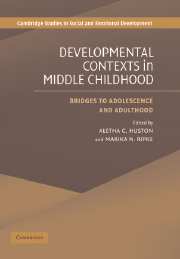Book contents
- Frontmatter
- Contents
- Contributors
- Foreword
- Acknowledgments
- 1 Middle Childhood: Contexts of Development
- 2 The Significance of Middle Childhood Peer Competence for Work and Relationships in Early Adulthood
- 3 Aggression and Insecurity in Late Adolescent Romantic Relationships: Antecedents and Developmental Pathways
- 4 Middle Childhood Family-Contextual and Personal Factors as Predictors of Adult Outcomes
- 5 Genetic and Environmental Influences on Continuity and Change in Reading Achievement in the Colorado Adoption Project
- 6 Reciprocal Effects of Mothers' Depression and Children's Problem Behaviors from Middle Childhood to Early Adolescence
- 7 Middle Childhood Life Course Trajectories: Links Between Family Dysfunction and Children's Behavioral Development
- 8 The Contribution of Middle Childhood Contexts to Adolescent Achievement and Behavior
- 9 Educational Tracking Within and Between Schools: From First Grade Through Middle School and Beyond
- 10 School Environments and the Diverging Pathways of Students Living in Poverty
- 11 The Relations of Classroom Contexts in the Early Elementary Years to Children's Classroom and Social Behavior
- 12 Out-of-School Time Use During Middle Childhood in a Low-Income Sample: Do Combinations of Activities Affect Achievement and Behavior?
- 13 Low-Income Children's Activity Participation as a Predictor of Psychosocial and Academic Outcomes in Middle Childhood and Adolescence
- 14 Healthy Mind, Healthy Habits: The Influence of Activity Involvement in Middle Childhood
- 15 Media Effects in Middle Childhood
- 16 Continuity and Discontinuity in Middle Childhood: Implications for Adult Outcomes in the UK 1970 Birth Cohort
- 17 Mandatory Welfare-to-Work Programs and Preschool-Age Children: Do Impacts Persist into Middle Childhood?
- 18 Effects of Welfare and Employment Policies on Middle-Childhood School Performance: Do They Vary by Race/Ethnicity and, If So, Why?
- 19 Effects of a Family Poverty Intervention Program Last from Middle Childhood to Adolescence
- 20 Experiences in Middle Childhood and Children's Development: A Summary and Integration of Research
- Author Index
- Subject Index
- References
20 - Experiences in Middle Childhood and Children's Development: A Summary and Integration of Research
Published online by Cambridge University Press: 16 September 2009
- Frontmatter
- Contents
- Contributors
- Foreword
- Acknowledgments
- 1 Middle Childhood: Contexts of Development
- 2 The Significance of Middle Childhood Peer Competence for Work and Relationships in Early Adulthood
- 3 Aggression and Insecurity in Late Adolescent Romantic Relationships: Antecedents and Developmental Pathways
- 4 Middle Childhood Family-Contextual and Personal Factors as Predictors of Adult Outcomes
- 5 Genetic and Environmental Influences on Continuity and Change in Reading Achievement in the Colorado Adoption Project
- 6 Reciprocal Effects of Mothers' Depression and Children's Problem Behaviors from Middle Childhood to Early Adolescence
- 7 Middle Childhood Life Course Trajectories: Links Between Family Dysfunction and Children's Behavioral Development
- 8 The Contribution of Middle Childhood Contexts to Adolescent Achievement and Behavior
- 9 Educational Tracking Within and Between Schools: From First Grade Through Middle School and Beyond
- 10 School Environments and the Diverging Pathways of Students Living in Poverty
- 11 The Relations of Classroom Contexts in the Early Elementary Years to Children's Classroom and Social Behavior
- 12 Out-of-School Time Use During Middle Childhood in a Low-Income Sample: Do Combinations of Activities Affect Achievement and Behavior?
- 13 Low-Income Children's Activity Participation as a Predictor of Psychosocial and Academic Outcomes in Middle Childhood and Adolescence
- 14 Healthy Mind, Healthy Habits: The Influence of Activity Involvement in Middle Childhood
- 15 Media Effects in Middle Childhood
- 16 Continuity and Discontinuity in Middle Childhood: Implications for Adult Outcomes in the UK 1970 Birth Cohort
- 17 Mandatory Welfare-to-Work Programs and Preschool-Age Children: Do Impacts Persist into Middle Childhood?
- 18 Effects of Welfare and Employment Policies on Middle-Childhood School Performance: Do They Vary by Race/Ethnicity and, If So, Why?
- 19 Effects of a Family Poverty Intervention Program Last from Middle Childhood to Adolescence
- 20 Experiences in Middle Childhood and Children's Development: A Summary and Integration of Research
- Author Index
- Subject Index
- References
Summary
Over two decades ago, when a major review of development in middle childhood was published (Collins, 1984), the authors concluded that middle childhood characteristics predict adolescent and adult development better than preschool indicators do. Although many people would not find this conclusion surprising, it contradicted two widespread notions: that a child's future is shaped in early childhood and that little of interest happens in middle childhood compared with “coming of age” in adolescence. The authors called for new research investigating the processes by which the phenomena of middle childhood account for later development, and more inquiry into the effects of middle childhood experiences and environments, particularly economic and cultural backgrounds, using more sophisticated methods to investigate complex developmental questions.
More than 20 years later, we are positioned to address middle childhood processes and environments with several context-rich longitudinal studies, many of which specifically examine economic and cultural variations. Advances in research methods and data analytic techniques allow a variety of new approaches to our central questions.
We address two related questions:
How do developmental patterns in middle childhood – both continuous and discontinuous – relate to directions taken in adolescence and adulthood?
What do experiences in the family, peer group, school, out-of-school time, and the larger economic and cultural milieus of middle childhood contribute to long-term developmental patterns?
- Type
- Chapter
- Information
- Developmental Contexts in Middle ChildhoodBridges to Adolescence and Adulthood, pp. 409 - 434Publisher: Cambridge University PressPrint publication year: 2006
References
- 6
- Cited by

